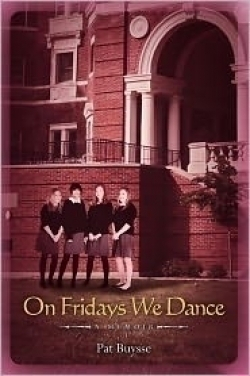On Fridays We Dance
A Memoir
When asked about religion, actress Anjelica Huston once commented, “On one hand, I pray; on the other hand, I don’t believe. I am constantly between the two.” While even the devout struggle with faith, it can lead us to unexpected and surprising places. A point made clear by Pat Buysse in On Fridays We Dance.
Part memoir, part novel, Buysse’s book focuses on Chloe Polowski, a thirteen-year-old who lives on a farm in rural Minnesota with her siblings, as well as her overworked mother and stressed-out father. A studious and spiritual pupil at St. Eli, Chloe plans on going to high school in a year’s time, but dreams of becoming a missionary. That is, until one of the sisters at St. Eli asks her if she’d like to attend Mater Dei, a convent boarding school, where she could study to become a nun. Chloe agrees.
Entering Mater Dei, however, isn’t easy. Chloe learns that there’s little free time, as the sisters work from dawn until dusk. She’s not allowed to wander beyond the grounds. And letters from her again-pregnant mother tear at her heart. But Mater Dei is also changing Chloe. It is teaching her the importance of discipline, self-sacrifice, and helping others. It is also opening her eyes to a world she once thought she knew. Still, Chloe wonders, is she choosing the right path?
It’s surprising that a story about a girl’s journey to womanhood in a convent could make a compelling reading experience, but On Fridays We Dance is a page-turner. Buysse’s story succeeds, in part, because she tells her tale in a clear, descriptive style and with realistic dialogue. For instance, when describing a cleaning frenzy on Chloe’s first day home from the convent, Buysse writes: “Soon a curious band of siblings gathered at the doorway to watch, flinching as [Chloe] raised a broom over their heads to swipe away cobwebs on the ceiling, wincing as she dashed it against the mop boards, jamming its frayed edges into corners, digging out dirt.”
Through her solid pacing, Buysse puts Chloe in some truly gut-wrenching scenarios. She worries for her family, struggles with an interest in a boy, waivers on whether convent life is for her, and ponders other issues, like a fellow student’s pregnancy. Chloe’s story is set not only at a time when she is maturing emotionally and spiritually, but during a period when the conformity of the 1950s is giving way to the cultural and sexual revolution of the 1960s; every now and then, the tendrils of this change intertwine with the story.
All in all, On Fridays We Dance is a fascinating look at convent life through the eyes of a young girl. Whether the reader holds memories of their own convent education or simply enjoys memoirs, Buysse’s story is sure to keep the pages turning.
Reviewed by
Katerie Prior
Disclosure: This article is not an endorsement, but a review. The publisher of this book provided free copies of the book and paid a small fee to have their book reviewed by a professional reviewer. Foreword Reviews and Clarion Reviews make no guarantee that the publisher will receive a positive review. Foreword Magazine, Inc. is disclosing this in accordance with the Federal Trade Commission’s 16 CFR, Part 255.

